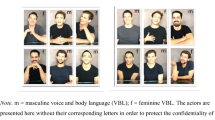Abstract
While more and more scholars are turning to the respective works of Hannah Arendt and Sigmund Freud to explain phenomena unknown to their times, such as the impact of the internet, few are using a synthesis of their ideas in political theory and psychoanalysis to understand modern topics. Even rarer is the inclination to draw parallels between the two thinkers on the question of sexual identity. In this article, I use Hannah Arendt and Sigmund Freud to discuss major features of modern sexuality: the experience of coming out, the identification as straight, gay visibility online, and the struggle for gay rights. I show that a knowledge of Arendtian and Freudian concepts, and particularly a marriage between them, is essential to investigate recent trends, topics and controversies related to sexual identity.
Similar content being viewed by others
References
Arendt, H. (1958a). The human condition. Chicago: University of Chicago Press.
Arendt, H. (1958b). Origins of totalitarianism. New York: Meridian.
Arendt, H. (1959, Winter). Reflections on Little Rock. Dissent Magazine.
Arendt, H. (1962, November 21). Letter to James Baldwin. In Library of Congress.
Arendt, H. (1964). Eichmann in Jerusalem. New York: Viking Press.
Felzer, J. (2019, March 23). Teen screen time linked to feelings of loneliness: The importance of spending time with friends. ABC news. Retrieved April 25, 2020, from https://abcnews.go.com/Health/teen-screen-time-linked-feeling-loneliner-important-spend/story?id=61880116.
Freud, S. (1905). Three essays on sexuality. The Standard Edition of the Complete Psychological Works of Sigmund Freud, 7, 126–335.
Freud, S. (1909). Notes upon a case of obsessional neurosis. The Standard Edition of the Complete Psychological Works of Sigmund Freud, 10, 151–318.
Freud, S. (1911). Formulations on the two principles of mental functioning. The Standard Edition of the Complete Psychological Works of Sigmund Freud, 12, 213–226.
Freud, S. (1914). On Narcissism. The Standard Edition of the Complete Psychological Works of Sigmund Freud, 14, 67–102.
Freud, S. (1915). Instincts and their Vicissitudes. The Standard Edition of the Complete Psychological Works of Sigmund Freud, 14, 109–140.
Freud, S. (1921). Group psychology and the analysis of the ego. The Standard Edition of the Complete Psychological Works of Sigmund Freud, 18, 65–144.
Freud, S. (1926). Address to the society of B’Nai B’Rith. The Standard Edition of the Complete Psychological Works of Sigmund Freud, 20, 271–274.
Freud, S. (1933). Why war? The Standard Edition of the Complete Psychological Works of Sigmund Freud, 22, 195–216.
Freud, S. (1938). An outline of psycho-analysis. The Standard Edition of the Complete Psychological Works of Sigmund Freud, 23, 139–208.
Honkasalo, J. (2014). Hannah Arendt as an ally for queer politics? Redescriptions: Political Thought, Conceptual History and Feminist Theory, 17, 180–200.
Jones, K. B. (2015). Queer(y)ing Hannah Arendt, or what’s Hannah Arendt got to do with intersectionality? New Political Science, 37(4), 458–475.
Launderville, D. (2003). Piety and politics. Grand Rapids: Wm. B. Eerdmans Publishing Company.
Lauretis, T. (2017). The queerness of the drive. Journal of Homosexuality, 64(14), 1913–1929.
Lowder, B. (2020, February 26). Pete Buttigieg denounces the politics that made him possible. Slate. Retrieved April 25, 2020, from https://slate.com/news-and-politics/2020/02/buttigieg-revolutionary-politics-1960s-stonewall.html.
Maslin, K. (2013). The gender-neutral feminism of Hannah Arendt. Hypatia, 28(3), 585–601.
Massad, J. A. (2007). Desiring Arabs. Chicago: University of Chicago Press.
Pfeiffer, E. (1972). Sigmund Freud and Lou Andreas-Salomé: Letters. Harcourt Brace Jovanovich.
Zaretsky, E. (2015). Political Freud: A history. New York: Columbia University Press.
Author information
Authors and Affiliations
Corresponding author
Additional information
Publisher's Note
Springer Nature remains neutral with regard to jurisdictional claims in published maps and institutional affiliations.
Rights and permissions
About this article
Cite this article
Dabbous, R. Hannah Arendt and Sigmund Freud on Sexual Identity in 2020. Sexuality & Culture 25, 835–851 (2021). https://doi.org/10.1007/s12119-020-09796-4
Accepted:
Published:
Issue Date:
DOI: https://doi.org/10.1007/s12119-020-09796-4




